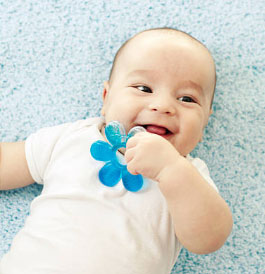Pediatric Dentistry FAQs
What is the difference between a pediatric dentist and general dentist?

Baby teeth actually have a different ratio of enamel, dentin, and pulp than permanent teeth. Along with that, the temporary nature of baby teeth means that they have a different effect on the mouth and on future oral health.
A dentist who specializes in pediatrics will have experience in the techniques needed for these smaller teeth and will be prepared with size-suitable equipment.
Our office is also especially experienced in helping treat children with special needs. Sometimes a little one will need a trained and understanding dental helper to get through their appointment. We stand ready and willing to be everything your child needs.
How can dentistry help kids that play sports?
It’s important to protect teeth during any sport that is likely to result in heavy contact. A custom-fitted mouthguard can get the job done, and it can do it more comfortably and effectively than other protective options.
How can I encourage my child to brush their teeth?
Education is vital to oral health. We can talk to your child about the germs on their teeth and how brushing can help. In the months between visits, you can keep this conversation going as you help your child brush before bedtime.
Many who don’t brush or floss do so because they don’t know why they should bother. Small rewards or bedtime songs may be very effective at encouraging young children to brush their teeth regularly, but thorough information and understanding is what will keep them at it as they grow older.
My child has crooked teeth. Do they need orthodontics?
The answer to this question will depend heavily on the individual circumstances of each case. However, as a general answer, orthodontic treatment has many excellent benefits, even for children who still have their baby teeth.
The positioning, crowding, and relative health of the baby teeth will directly affect the permanent teeth that follow. While a child’s mouth is still developing, it is easier to adjust teeth and keep them adjusted. Early orthodontics can therefore keep the adult teeth safe, and it may prevent many future issues from developing in the first place.
What should I do in the event of a dental emergency?
Any chip, break, or crack in a tooth should be looked at by a dentist, eventually. This type of damage can expose the soft inner tissues of the tooth, making it susceptible to further damage and infection.
The depth of the damage will determine whether the situation is an emergency or not. If the crack runs very deep, or the tooth is no longer in one piece, call us immediately.
If the tooth has come out completely, handle it only by the crown. Rinse it gently and place it back into the socket, if possible. If this isn’t possible, store it in milk, then call us right away. The sooner we get to a knocked-out tooth, the better chance we have of saving it.
What is the best toothpaste for my child?
There are several great products out on the market right now. We recommend that you choose one that is ADA (American Dental Association) approved, so you can be sure the toothpaste is both safe and effective for your little one.
Be sure to use a toothpaste with a fluoride content that is age-appropriate. If you have questions about this, we can help you select the right toothpaste for your child.
My child grinds his/her teeth at night. Is this a problem?
Tooth grinding can wear down teeth and cause tension in the temporomandibular joints (TMJ) if left untreated for too long. There are several options we can provide in order to assist your child in reducing bruxism, including customized mouthguards. Talk to us about what your options are.
Should cavities in baby teeth be filled?
Yes. It may seem strange to do dental work on teeth that are temporary; however, there are two very strong reasons to care for the baby teeth just as you would permanent ones.
- Children don’t lose the last of their baby teeth until around age twelve. Twelve years is a very long time to live with a damaged tooth. Untreated cavities can cause a great deal of pain, and may even spread to other teeth.
- As mentioned above, the health of the baby teeth directly impacts the health of the permanent teeth that replace them. Leaving infected and damaged teeth can cause future dental difficulties with the adult teeth as they grow in.
What foods are best for my child’s dental health?
You should follow guidelines for healthy nutrition and make sure your child has a well-balanced diet. In particular, we encourage a calcium-rich diet to help build the strength of your child’s teeth.
In addition to ensuring that your child is eating a balanced diet, we recommend avoiding certain foods. Candy, juice, and soda are nice treats, but children who consume these items on a regular basis suffer from cavities as well as a host of other health problems.
Is sedation dentistry safe for children?
Not all sedation types are useful in pediatrics. However, our office employs laughing gas, which is just as safe for a child as it is for an adult.
Laughing gas doesn’t metabolize, which means that it will not be absorbed into the body. There will be no lingering drowsiness, no surprise aftershocks of its effects, and no lengthy preparation for receiving it. It is also non-allergenic.
Are dental x-rays safe?
They are. In fact, they are even safer than they have ever been, now that the dental industry has moved to digital x-rays. The amount of radiation needed for clear and effective digital images is small; with our modern techniques and equipment, the exposure to radiation is down to a fraction of a second.
